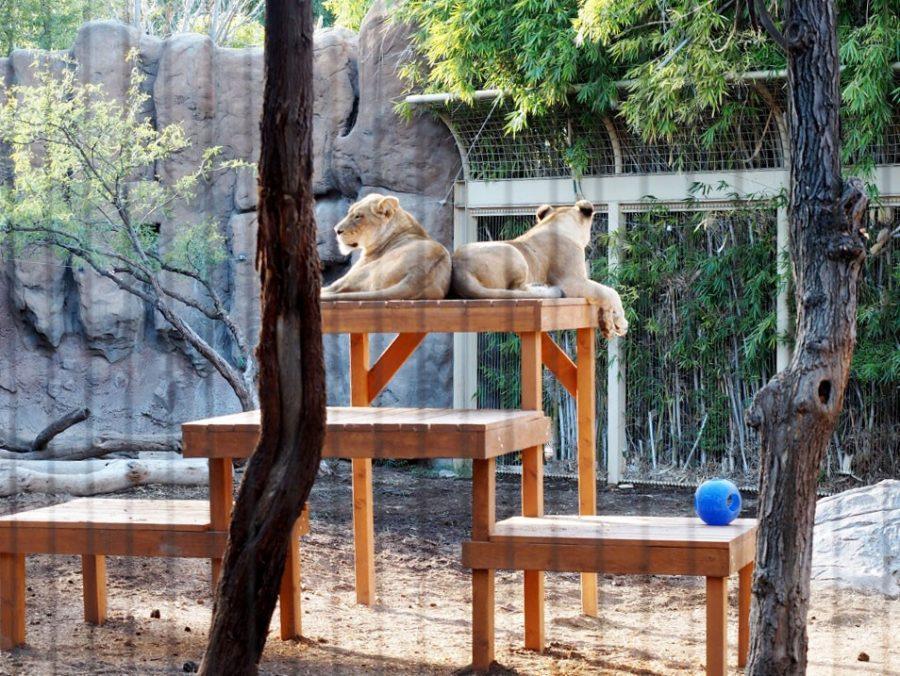After months of dedicated fundraising, Reid Park Zoo broke ground Sunday, Jan. 22. on a 9,000-square-foot animal health center where UA students will work closely with trained veterinarians.
The new center will put the Reid Park on the forefront of zoo medicine, facilitating the treatment of an increasing number of animals.
“There is much more to a zoo than just displaying animals and this new hospital will allow us to better provide whole-life care from cradle to grave,” said zoo administrator Jason Jacobs.
UA students will be living at the animal health center in call rooms for weeks at a time where they’ll immerse themselves in the field of exotic animal care, actively participating in animal treatment.
RELATED: Reid Park Zoo trains Shombay the lion to willingly take subcutaneous fluids and fight for his life
“There will be an observation room where students can observe surgeries, and it’ll be floor to ceiling windows,” Jacobs said.
Vice President of the College of Agriculture and Life Sciences, Shane Burgess, serves as the liaison between UA and Reid Park Zoo. Burgess emphasizes that hands-on training in these facilities will be central to UA’s new Doctor of Veterinary Medicine Program.
“This work is a core part of the curriculum—it’s compulsory,” Burgess said. “If you wanted to get out of it, you couldn’t.”
The program is targeted at teaching a wide breadth of knowledge, spanning far past veterinary science alone. These students will gain important skills in a variety of fields, including business and human relations. Burgess attests that allowing students to pursue their passion creates an environment conducive to their learning.

The zoo relies on donations from community members and careful thought when handling money. Knowledge of business is essential in making sure these functions are executed properly. Exposing students to these principles will teach skills students may otherwise be unfamiliar with.
“If they are not that interested in business, they would not be that interested in learning it, but in the context of something they care about and are passionate about, they will learn it,” Burgess said.
In effect, by the time students graduate from the program, they will have received a well-rounded education—an education Burgess believes would be nearly impossible to recreate in the classroom.
Most collegiate veterinary programs include direct interaction with domesticated animals such as cats and dogs. However, veterinary students at the UA will have the unique opportunity to work with exotic animals. Contact with these animals may be all that is needed to catalyze a passion within students.
“Once you stand in front of a 10,000-pound bull elephant, what else is there,” said Reid Park Zoo veterinarian Alexis Moreno.
Moreno, a UA graduate herself, will be one of the veterinarians instructing at the animal health center. Much of Moreno’s duties at the zoo lack clear solutions and defined protocol. Her job consists of brainstorming innovative ways to treat animals.
“You can feed a dog a pill, but how do you medicate a rhino?” Moreno asked.
The field of veterinary science is extraordinarily competitive with only a handful of full-time exotic animal veterinarians employed in the United States. However, with the UA being the only school to offer this type of program, students will have an advantage in an aggressive market.
RELATED: Reid Park Zoo announces partnership with UA vet school
“It’s a competitive field all about who you know and if you can get your foot in the door anywhere,” Moreno said.
The UA’s donation to Reid Park Zoo Animal Health Center is important for both students and the community. The zoo itself is involved in worldwide conservation as a portion of the money spent at the zoo is directly put towards these efforts.
“It’s not just about coming and looking at the hedgehogs, though they are pretty cute,” said Council Member Steve Kozachik. “It is about supporting the work that they are doing from the standpoint of education, conservation and getting experiences.”
The building of this animal health center warrants excitement from those involved, who believe it will prepare UA graduates to become leaders in the field of veterinary science.
“Our students will have the most experience of any students in the entire country—actually in the world,” Burgess said.
Follow Kelly Dorney on Twitter.








